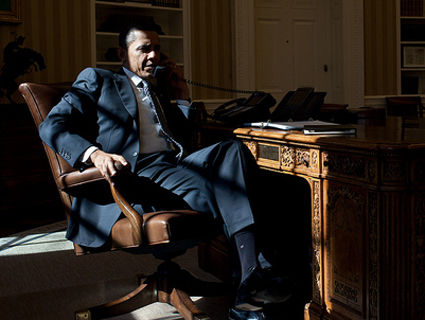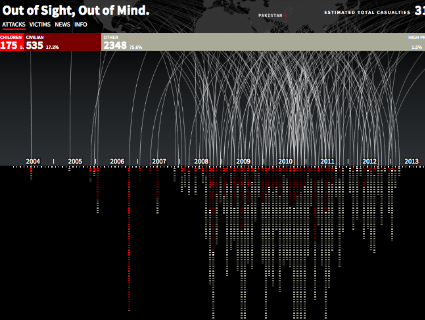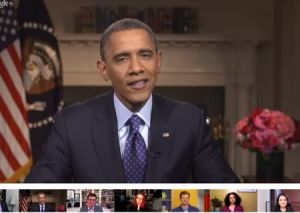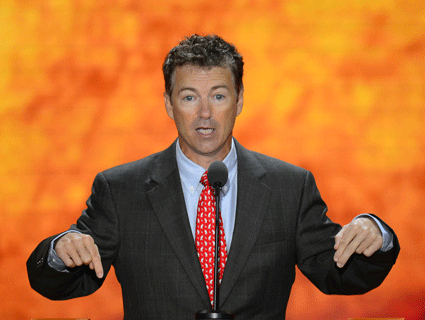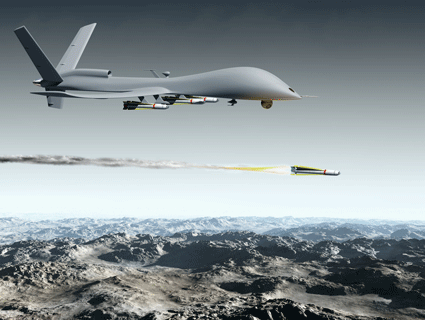
<a href="http://www.shutterstock.com/cat.mhtml?lang=en&search_source=search_form&search_tracking_id=dUvHlcPg7o1oKq6Z2APkTw&version=llv1&anyorall=all&safesearch=1&searchterm=drone&search_group=&orient=&search_cat=&searchtermx=&photographer_name=&people_gender=&people_age=&people_ethnicity=&people_number=&commercial_ok=&color=&show_color_wheel=1#id=116770390&src=tP18gSgEopYNTEcegx6USg-1-1">Paul Fleet</a>/Shutterstock
In recent years, conservative and liberal reaction to President Barack Obama’s national security policies has often converged. Conservatives note that Obama has continued (or expanded) many of the Bush-Cheney policies and methods—drones, indefinite detention, military commissions, use of the state secrets privilege—and this, they proclaim, proves that the Bush-Cheney regime was not excessive or unlawful. Liberals, pointing to Obama’s decisions in these areas, complain that the fellow who once campaigned against the excesses of the Bush-Cheney years has gone over to the dark side. A Justice Department white paper leaked in February explaining the administration’s justification for targeted killing abroad of US citizens suspected of terrorism embodied the sort of executive power overreach associated with Obama’s predecessor. And the Obama administration’s fierce pursuit of national security leaks—which led the Justice Department to collect secretly information on the communications of the Associated Press and James Rosen of Fox News—reinforces the view that Obama has taken a step or two toward an imperial presidency.
White House aides rankle at any comparison to Bush and Cheney. They dutifully note that in his first days in office, Obama ended the use of torture (a.k.a. enhanced interrogation techniques) and declared his intention to shut down Guantanamo. (Gitmo remains open, but that’s mainly because congressional Republicans and Democrats thwarted the White House effort to develop a high-security facility in the United States to house the detainees.) And the Obama-ites contend they have reformed some of the Bush-Cheney policies, such as the use of military commissions, to justify maintaining these practices. Also, they are not reluctant to add that Obama did end the war in Iraq and is downsizing the war in Afghanistan (at a faster pace than then-Secretary of State Hillary Clinton and then-CIA chief David Petraeus urged in 2011). But much of this defense has tended to get lost as the administration has fired off drone strikes without acknowledging the individual attacks and has, following in the path of previous administrations, resisted certain congressional oversight efforts.
So Obama’s speech Thursday on counterterrorism policies—which follows his administration’s acknowledgment yesterday that it had killed four Americans (including Anwar al-Awlaki, an Al Qaeda leader in Yemen)—is a big deal, for with this address, Obama is self-restricting his use of drones and shifting control of them from the CIA to the military. And the president has approved making public the rules governing drone strikes.
The New York Times received the customary pre-speech leak and reported:
A new classified policy guidance signed by Mr. Obama will sharply curtail the instances when unmanned aircraft can be used to attack in places that are not overt war zones, countries like Pakistan, Yemen and Somalia. The rules will impose the same standard for strikes on foreign enemies now used only for American citizens deemed to be terrorists.
Lethal force will be used only against targets who pose “a continuing, imminent threat to Americans” and cannot feasibly be captured, Attorney General Eric H. Holder Jr. said in a letter to Congress, suggesting that threats to a partner like Afghanistan or Yemen alone would not be enough to justify being targeted.
These moves may not satisfy civil-liberties-minded critics on the right and the left. Obama is not declaring an end to indefinite detention or announcing the closing of Gitmo—though he is echoing his State of the Union vow to revive efforts to shut down that prison. Still, these moves would be unimaginable in the Bush years. Bush and Cheney essentially believed the commander in chief had unchallenged power during wartime, and the United States, as they saw it, remained at war against terrorism. Yet here is Obama subjecting the drone program to a more restrictive set of rules—and doing so publicly. This is very un-Cheney-like. (How soon before the ex-veep arises from his undisclosed location to accuse Obama of placing the nation at risk yet again?)
Despite Obama’s embrace of certain Bush-Cheney practices and his robust use of drones, the president has tried since taking office to shift US foreign policy from a fixation on terrorism. During his first days in office, he shied away from using the “war on terrorism” phrase. And his national security advisers have long talked of Obama’s desire to reorient US foreign policy toward challenges in the Pacific region. By handing responsibility for drone strikes to the military, Obama is helping CIA chief John Brennan, who would like to see his agency move out of the paramilitary business and devote more resources to its traditional tasks of intelligence gathering and analysis.
With this speech, Obama is not renouncing his administration’s claim that it possesses the authority to kill an American overseas without full due process. The target, as Holder noted in that letter to Congress, must be a senior operational leader of Al Qaeda or an associated group who poses an “imminent threat of violent attack against the United States” and who cannot be captured, and Holder stated that foreign suspects now can only be targeted if they pose “a continuing, imminent threat to Americans.” (Certainly, there will be debates over the meaning of “imminent,” especially given that the Obama administration has previously used an elastic definition of imminence.) And Obama is not declaring an end to the dicey practice of indefinite detention or a conclusion to the fight against terrorism.
But the speech may well mark a pivot point. Not shockingly, Obama is attempting to find middle ground, where there is more oversight and more restraint regarding activities that pose serious civil liberties and policy challenges. The McCainiacs of the world are likely to howl about any effort to place the effort to counter terrorism into a more balanced perspective. The civil libertarians will scoff at half measures. But Obama, at the least, is showing that he does ponder these difficult issues in a deliberative manner and is still attempting to steer the nation into a post-9/11 period. That journey, though, may be a long one.
UPDATE: Here are excerpts from Obama’s speech:
* Obama reminds his audience of the Bush-Cheney excesses: “Meanwhile, [after 9/11] we strengthened our defenses—hardening targets, tightening transportation security, and giving law enforcement new tools to prevent terror. Most of these changes were sound. Some caused inconvenience. But some, like expanded surveillance, raised difficult questions about the balance we strike between our interests in security and our values of privacy. And in some cases, I believe we compromised our basic values—by using torture to interrogate our enemies, and detaining individuals in a way that ran counter to the rule of law.”
* Obama suggests that the idea of a total and never-ending war on terrorism is no longer a useful concept: “So America is at a crossroads. We must define the nature and scope of this struggle, or else it will define us, mindful of James Madison’s warning that ‘No nation could preserve its freedom in the midst of continual warfare.’ Neither I, nor any President, can promise the total defeat of terror. We will never erase the evil that lies in the hearts of some human beings, nor stamp out every danger to our open society. What we can do—what we must do—is dismantle networks that pose a direct danger, and make it less likely for new groups to gain a foothold, all while maintaining the freedoms and ideals that we defend. To define that strategy, we must make decisions based not on fear, but hard-earned wisdom. And that begins with understanding the threat we face. Today, the core of al Qaeda in Afghanistan and Pakistan is on a path to defeat.”
* Obama calls for a new realism regarding terrorism: “Lethal yet less capable al Qaeda affiliates. Threats to diplomatic facilities and businesses abroad. Homegrown extremists. This is the future of terrorism. We must take these threats seriously, and do all that we can to confront them. But as we shape our response, we have to recognize that the scale of this threat closely resembles the types of attacks we faced before 9/11. In the 1980s, we lost Americans to terrorism at our Embassy in Beirut; at our Marine Barracks in Lebanon; on a cruise ship at sea; at a disco in Berlin; and on Pan Am Flight 103 over Lockerbie. In the 1990s, we lost Americans to terrorism at the World Trade Center; at our military facilities in Saudi Arabia; and at our Embassy in Kenya. These attacks were all deadly, and we learned that left unchecked, these threats can grow. But if dealt with smartly and proportionally, these threats need not rise to the level that we saw on the eve of 9/11.”
* Obama says lethal drone strikes pose a challenge, acknowledges the civilian casualties, but defends the practice: “Beyond the Afghan theater, we only target al Qaeda and its associated forces. Even then, the use of drones is heavily constrained. America does not take strikes when we have the ability to capture individual terrorists —our preference is always to detain, interrogate, and prosecute them. America cannot take strikes wherever we choose – our actions are bound by consultations with partners, and respect for state sovereignty. America does not take strikes to punish individuals—we act against terrorists who pose a continuing and imminent threat to the American people, and when there are no other governments capable of effectively addressing the threat. And before any strike is taken, there must be near-certainty that no civilians will be killed or injured—the highest standard we can set.
This last point is critical, because much of the criticism about drone strikes —at home and abroad—understandably centers on reports of civilian casualties. There is a wide gap between U.S. assessments of such casualties, and non-governmental reports. Nevertheless, it is a hard fact that U.S. strikes have resulted in civilian casualties, a risk that exists in all wars. For the families of those civilians, no words or legal construct can justify their loss. For me, and those in my chain of command, these deaths will haunt us as long as we live, just as we are haunted by the civilian casualties that have occurred through conventional fighting in Afghanistan and Iraq. But as Commander-in-Chief, I must weigh these heartbreaking tragedies against the alternatives. To do nothing in the face of terrorist networks would invite far more civilian casualties—not just in our cities at home and facilities abroad, but also in the very places—like Sana’a and Kabul and Mogadishu—where terrorists seek a foothold. Let us remember that the terrorists we are after target civilians, and the death toll from their acts of terrorism against Muslims dwarfs any estimate of civilian casualties from drone strikes.”
* Obama tells Sen. Rand Paul to take a hike—or kind of: “I’ve insisted on strong oversight of all lethal action. After I took office, my administration began briefing all strikes outside of Iraq and Afghanistan to the appropriate committees of Congress. Let me repeat that—not only did Congress authorize the use of force, it is briefed on every strike that America takes. That includes the one instance when we targeted an American citizen: Anwar Awlaki, the chief of external operations for AQAP. This week, I authorized the declassification of this action, and the deaths of three other Americans in drone strikes, to facilitate transparency and debate on this issue, and to dismiss some of the more outlandish claims. For the record, I do not believe it would be constitutional for the government to target and kill any U.S. citizen—with a drone, or a shotgun—without due process. Nor should any President deploy armed drones over U.S. soil. But when a U.S. citizen goes abroad to wage war against America – and is actively plotting to kill U.S. citizens; and when neither the United States, nor our partners are in a position to capture him before he carries out a plot – his citizenship should no more serve as a shield than a sniper shooting down on an innocent crowd should be protected from a swat team.”
* Obama calls for more oversight of the drone attacks, noting it may be hard to come up with the most effective procedures: “Going forward, I have asked my administration to review proposals to extend oversight of lethal actions outside of war zones that go beyond our reporting to Congress. Each option has virtues in theory, but poses difficulties in practice. For example, the establishment of a special court to evaluate and authorize lethal action has the benefit of bringing a third branch of government into the process, but raises serious constitutional issues about presidential and judicial authority. Another idea that’s been suggested —the establishment of an independent oversight board in the executive branch – avoids those problems, but may introduce a layer of bureaucracy into national-security decision-making, without inspiring additional public confidence in the process. Despite these challenges, I look forward to actively engaging Congress to explore these—and other—options for increased oversight.”
* Obama defends the Justice Department targeting journalists in leak investigations, but calls on Holder to review the department’s actions and supports a media shield law: “The Justice Department’s investigation of national security leaks offers a recent example of the challenges involved in striking the right balance between our security and our open society. As commander-in chief, I believe we must keep information secret that protects our operations and our people in the field. To do so, we must enforce consequences for those who break the law and breach their commitment to protect classified information. But a free press is also essential for our democracy. I am troubled by the possibility that leak investigations may chill the investigative journalism that holds government accountable. Journalists should not be at legal risk for doing their jobs. Our focus must be on those who break the law. That is why I have called on Congress to pass a media shield law to guard against government over-reach. I have raised these issues with the attorney general, who shares my concern. So he has agreed to review existing Department of Justice guidelines governing investigations that involve reporters, and will convene a group of media organizations to hear their concerns as part of that review. And I have directed the attorney general to report back to me by July 12th.”
* Obama calls for an end to the post-9/11 authority to wage war Congress granted the president: “I intend to engage Congress about the existing Authorization to Use Military Force, or AUMF, to determine how we can continue to fight terrorists without keeping America on a perpetual war-time footing. The AUMF is now nearly twelve years old. The Afghan War is coming to an end. Core al Qaeda is a shell of its former self. Groups like AQAP must be dealt with, but in the years to come, not every collection of thugs that labels themselves al Qaeda will pose a credible threat to the United States. Unless we discipline our thinking and our actions, we may be drawn into more wars we don’t need to fight, or continue to grant presidents unbound powers more suited for traditional armed conflicts between nation states. So I look forward to engaging Congress and the American people in efforts to refine, and ultimately repeal, the AUMF’s mandate. And I will not sign laws designed to expand this mandate further. Our systematic effort to dismantle terrorist organizations must continue. But this war, like all wars, must end. That’s what history advises. That’s what our democracy demands.
* Obama says he’s serious about shutting down Gitmo: “I have tried to close Gitmo. I transferred 67 detainees to other countries before Congress imposed restrictions to effectively prevent us from either transferring detainees to other countries, or imprisoning them in the United States. These restrictions make no sense. After all, under President Bush, some 530 detainees were transferred from Gitmo with Congress’s support. When I ran for President the first time, John McCain supported closing Gitmo. No person has ever escaped from one of our super-max or military prisons in the United States. Our courts have convicted hundreds of people for terrorism-related offenses, including some who are more dangerous than most Gitmo detainees. Given my Administration’s relentless pursuit of al Qaeda’s leadership, there is no justification beyond politics for Congress to prevent us from closing a facility that should never have been opened. Today, I once again call on Congress to lift the restrictions on detainee transfers from Gitmo. I have asked the Department of Defense to designate a site in the United States where we can hold military commissions. I am appointing a new, senior envoy at the State Department and Defense Department whose sole responsibility will be to achieve the transfer of detainees to third countries. I am lifting the moratorium on detainee transfers to Yemen, so we can review them on a case by case basis. To the greatest extent possible, we will transfer detainees who have been cleared to go to other countries. Where appropriate, we will bring terrorists to justice in our courts and military justice system. And we will insist that judicial review be available for every detainee….[H]istory will cast a harsh judgment on this aspect of our fight against terrorism, and those of us who fail to end it. Imagine a future—ten years from now, or twenty years from now—when the United States of America is still holding people who have been charged with no crime on a piece of land that is not a part of our country. Look at the current situation, where we are force-feeding detainees who are holding a hunger strike. Is that who we are? Is that something that our Founders foresaw? Is that the America we want to leave to our children?”

